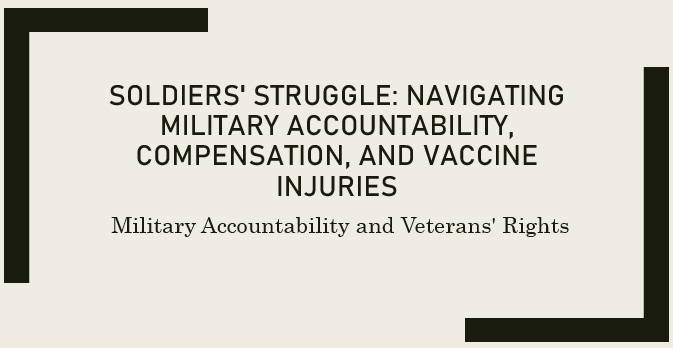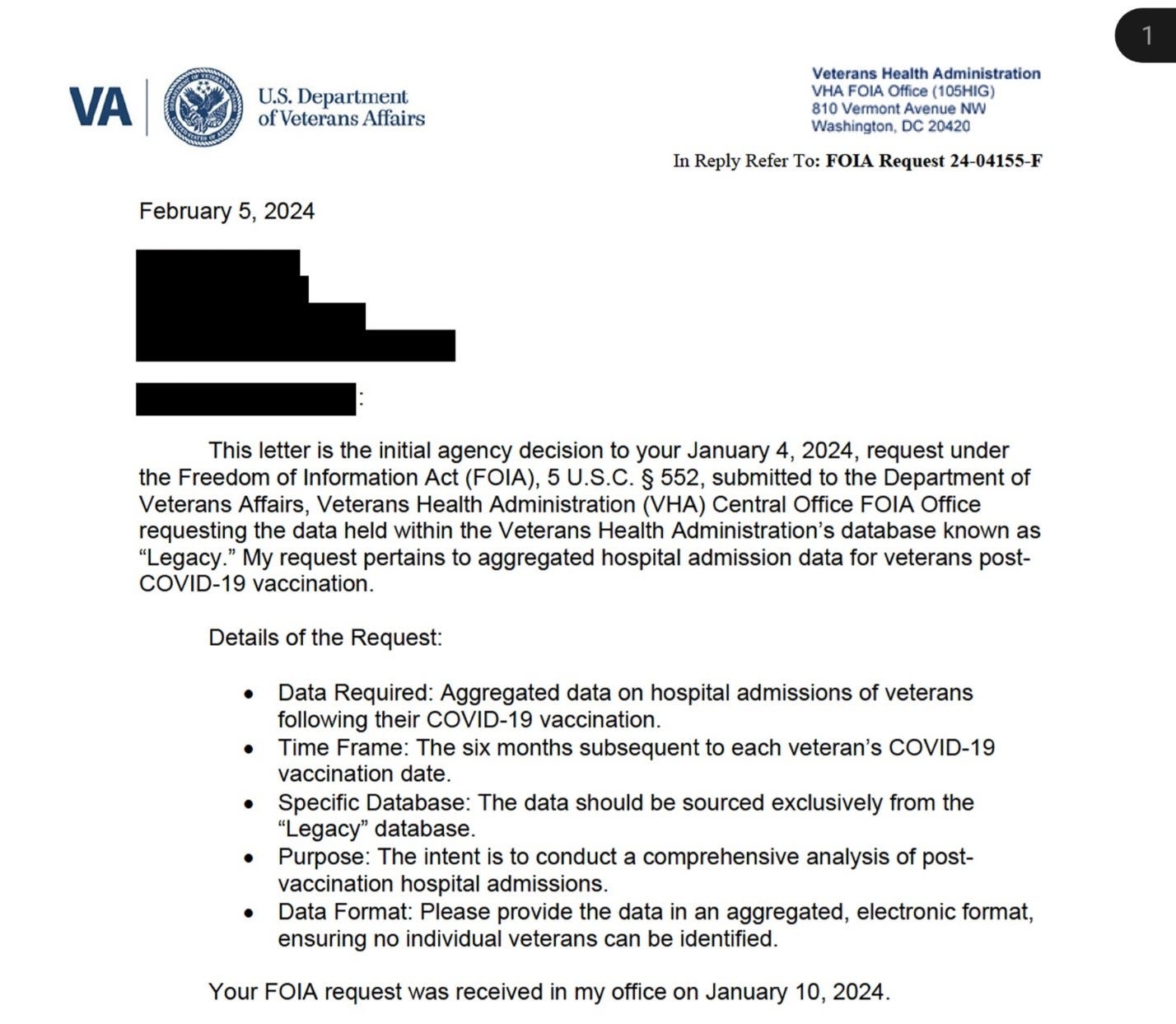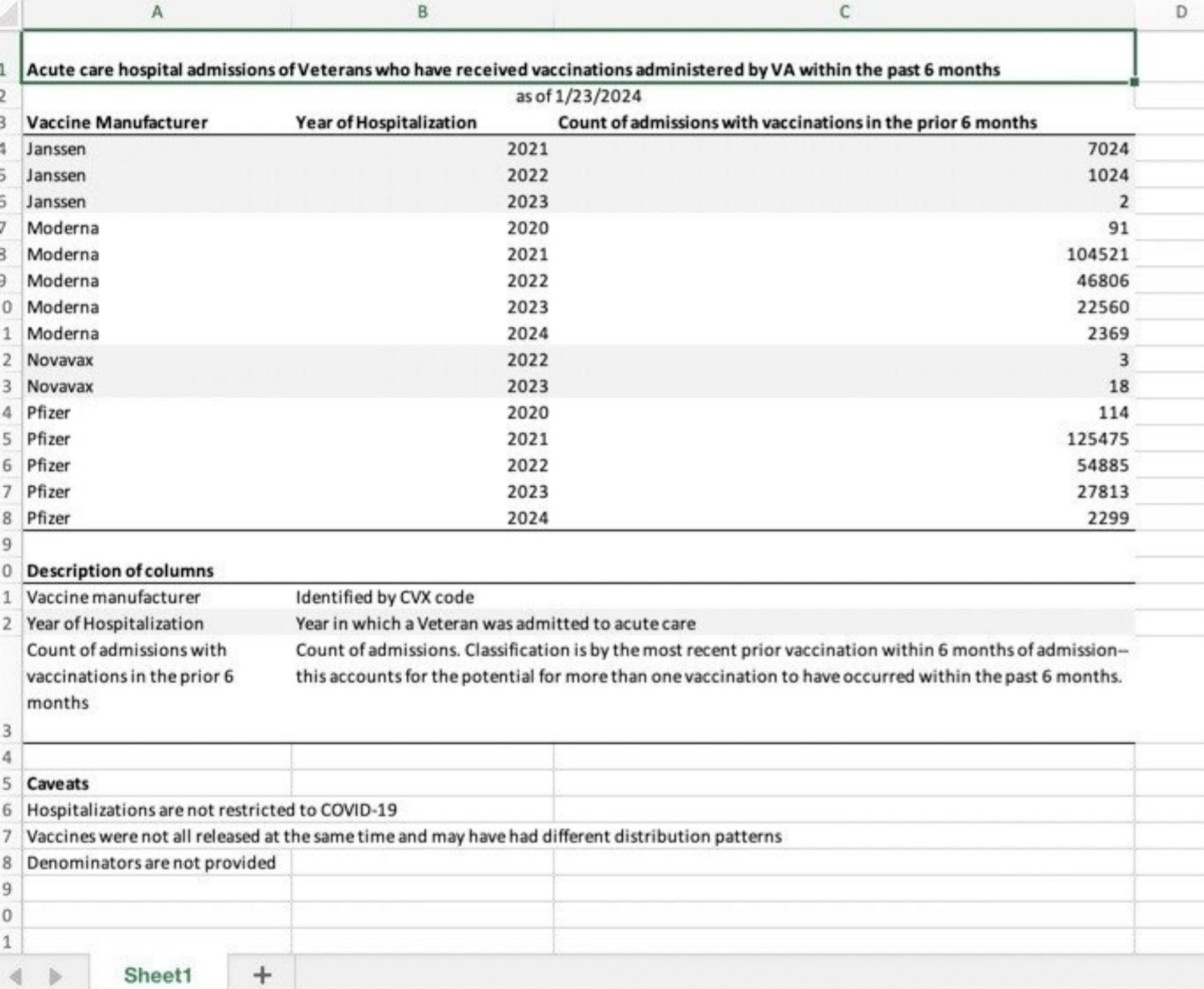Soldiers' Struggle: Navigating Military Accountability, Compensation, and Vaccine Injuries
Military Accountability and Veterans' Rights
In the ongoing battle for military accountability and veterans' rights, the recent update on the Declaration of Military Accountability (DMA) took center stage in a Twitter Space hosted by Brad Miller (@bradmiller1010 on X) on February 9, 2024. Miller on X Spearheaded by Miller and his colleagues, the DMA discussion focused on the military movement launched in 2024 to hold the Department of Defense (DoD) accountable for the controversial mandate of experimental COVID "vaccines" – injections, and more. While the DMA addresses a wide range of issues related to overall military accountability, this article delves into the multifaceted challenges faced by service members, including navigating the interdependencies of compensation from the DoD and Veteran Affairs (VA), alongside broader regulatory concerns and internal Standard Operating Procedures (SOPs) within the VA. Amidst these interdependencies, concerns about compensation from DoD and Veteran Affairs (VA) for service-connected so-called "vaccine" injection reactions have come to the forefront, highlighting a critical juncture in addressing military accountability and safeguarding veterans' rights. #militaryaccountability
NOTE: It's imperative to emphasize that while commonly referred to as "vaccines," these injections, originally classified by manufacturers like Moderna and Pfizer as gene therapy, are, in essence, experimental gene therapies. The term "vaccine" is used here cautiously, reflecting the terminology commonly employed in public discourse, but it's crucial to recognize the accurate classification of these products as gene therapy. This distinction is essential to prevent proponents from advancing their version of public health under the guise of traditional vaccination.
Compensation Amidst Conflicting Data
The debate surrounding compensation for vaccine injuries among service members has reached a crescendo amidst conflicting data and policy disparities. While whistleblowers have brought to light a discernible surge in adverse health outcomes post-COVID vaccination, the Department of Defense (DoD) has vehemently refuted any significant increase in disease rates among service members.
Adding to the complexity, service members seeking medical assistance for COVID vaccine reactions are encountering formidable obstacles within the military healthcare system. Reports indicate genetic testing is being utilized during the diagnosis process, potentially jeopardizing individuals' eligibility for service-connected benefits. While it’s unlikely that genetic testing could override the initial health assessment at entry showing no pre-existing condition, if the genetic testing were to establish a pre-existing condition, the VA must still address the likelihood of service-related aggravation. With the non-adversarial system designed to favor the veteran, along with the benefit of the doubt rule, arguments for service-related aggravation are likely to prevail.
With this in mind however - internal Standard Operating Procedures (SOPs) within the Veterans Affairs (VA) hint at a concerning attempt to downplay the adverse effects of the injections.
Despite the evident toxicity of these injections, which should warrant their classification under the Toxic Exposure Risk Activity provisions of the PACT Act, there appears to be a deliberate effort to obscure the true impact of these reactions.
This aligns with findings from recent studies by Lesgards et al. (2023), Palmer (2023), and Ndeupen et al. (2021), which highlight the toxicity and inflammatory nature of the spike protein and mRNA-LNP platform used in COVID-19 vaccines." Lesgards Ndeupen Palmer
Presumption of Soundness and Toxic Exposure Risk Activity (TERA)
The discussion over compensation for vaccine injuries among service members has intensified in the wake of contradictory data and policy inconsistencies. Despite whistleblower reports indicating a surge in adverse health effects post-COVID vaccination, DoD has refuted claims of significant increases in diseases among service members.
Moreover, service members seeking medical attention for COVID vaccine reactions have encountered obstacles within the military healthcare system. Reports suggest that genetic testing is being ordered as part of the diagnosis process, potentially disqualifying affected individuals from service-connected benefits.
Furthermore, the VA's internal Standard Operating Procedures (SOP) indicate a concerning approach to vaccine-related toxicity. According to the VA SOP, vaccines and medications are not classified as participation in a Toxic Exposure Risk Activity (TERA), with the rationale being a lack of scientific or medical evidence supporting long-term adverse health effects resulting from vaccines and medications administered to Service Members.
“Vaccines and medications in general are not considered participation in a Toxic Exposure Risk Activity (TERA) because there is no scientific or medical evidence that supports the conclusion that vaccines and medications administered to Service Members have resulted in long-term adverse health effects." Obtained from VA Whistleblower - VA SOP
This stance underscores a stark disparity between reported experiences of service members, the abundant documentation of adverse effects in the scientific literature, and raises profound concerns regarding the transparency and accountability of VA policies regarding vaccine-related injuries.
Veterans Affairs' Role in Vaccine Injury Compensation
Veterans receiving COVID vaccines through Veterans Affairs (VA) healthcare encounter significant obstacles in securing compensation for adverse reactions. Despite tens of thousands of veterans experiencing hospitalization post-vaccination, VA policies often obstruct rather than facilitate the claims process, leaving many veterans without the support they need. Title 38 USC 1151 outlines eligibility criteria for compensation related to VA healthcare-related disabilities. However, a lack of awareness among veterans regarding their entitlements under this provision exacerbates the already convoluted claims process. Consequently, veterans navigate bureaucratic red tape and institutional apathy when seeking redress for vaccine-related injuries.
Legislative Intent vs. VA Policy Implementation
Furthermore, Section 1168 of Title 38, U.S. Code, mandates medical evaluations for veterans claiming disabilities resulting from service-related toxic exposures. Despite this legislative mandate, the VA's internal Standard Operating Procedures (SOP) pose a significant barrier to recognizing vaccine-related injuries as qualifying for Toxic Exposure Risk Activity (TERA). This discrepancy underscores a profound dissonance between legislative intent and VA policy implementation, depriving veterans of the compensation and support they rightly deserve.
Section 1168 of Title 38, U.S. Code
Section 1168 of Title 38, U.S. Code, mandates medical evaluations for veterans claiming disabilities resulting from service-related toxic exposures. It emphasizes the importance of thorough medical assessments to determine the extent of disabilities attributable to toxic exposures during military service. This section underscores the VA's responsibility to recognize and address the health consequences of toxic exposures experienced by veterans, ensuring they receive appropriate compensation and healthcare services. However, it appears that the VA's internal policies may not align with the intent of this legislative mandate, creating barriers for veterans seeking compensation for vaccine-related injuries under the Toxic Exposure Risk Activity (TERA) provision. Section 1168
Whistleblower Advocacy and Demands for Transparency
Early Warnings and Suspicions
Whistleblowers raised concerns about the COVID-19 residual scheme even before the introduction of the TERA policy. Their suspicions grew when vaccine injuries began being attributed to COVID residuals, a narrative that seemed premeditated. In May 2022, a policy letter further fueled suspicions by focusing solely on COVID-19 infection residuals, such as heart inflammation and blood clots, while neglecting to address vaccine-related injuries. This selective approach hinted at an intentional effort within the VA to conceal potential vaccine injuries amid similar post-infection symptoms.
As whistleblowers continue to advocate for transparency and demand accountability, it is imperative that the VA and the broader military healthcare system heed these calls for action.
Addressing the challenges faced by veterans in accessing compensation for vaccine-related injuries, as well as ensuring transparency in reporting and addressing adverse events, must be prioritized to safeguard the health and well-being of service members and veterans.
Dr. Crisanna Shackelford (@DrC_Shackelford on X) tweeted the data from a FOIA request of the Veterans Healthcare Administrations (VHA) database known as Legacy, reporting that tens of thousands of veterans were hospitalized within six months following the COVID vaccine. Shackelford on X Moving forward, fostering a culture of transparency, accountability, and evidence-based decision-making will be paramount in restoring trust and confidence in the military healthcare system. By amplifying the voices of affected individuals, advocating for policy reform, and demanding transparency in vaccine administration, we can work towards a system that prioritizes the safety and welfare of those who have served our nation.
Challenging the VA's Stance
The VA's current stance, denying the existence of long-term adverse effects from COVID-19 vaccinations, is deeply flawed. This assertion, used to exclude COVID-19 vaccines from the TERA provision of the PACT Act, overlooks critical factors, particularly the novel mRNA vaccine technology employed. By relying on outdated data from traditional vaccines to justify this exclusion, the VA disregards substantial evidence of known harms and adverse health effects associated with COVID-19 vaccines. Moreover, the attempt to categorize mRNA technology as equivalent to traditional vaccines is scientifically unsound. Unlike traditional vaccines, mRNA vaccines lack a precedent for long-term effects and have never undergone thorough evaluation for such outcomes. Consequently, the VA's policy not only ignores the toxic nature of mRNA vaccines but also denies service members the comprehensive medical evaluations and benefits they rightfully deserve. 1168 and TERA
Call for Policy Revision
Given the significant differences between mRNA vaccines and traditional counterparts, coupled with the absence of long-term data, it is imperative that the VA revises its policy. An accurate understanding of the toxic characteristics of mRNA vaccines, along with current scientific evidence, should form the basis for decisions affecting the health and welfare of service members. This revision is essential to ensure transparency, accountability, and the protection of veterans' rights and well-being.
Demanding Transparency: Veterans' Hospitalizations Post-COVID-19 Vaccination & VA's Stance on Long-Term Adverse Effects
Uncovering Adverse Event Data
Whistleblowers have diligently collected adverse event data to shed light on the impact of COVID-19 vaccinations among veterans. This data, gathered through exhaustive efforts, reveals concerning trends in veterans' hospitalizations following COVID-19 vaccination. Thousands of veterans have been hospitalized within six months of receiving the COVID-19 jab, prompting questions about the underlying causes and the VA's response to these incidents.
Challenges in Obtaining Transparency
The graph above, obtained through a partially redacted FOIA request linked to the military accountability petition, underscores the urgent need for transparency regarding vaccine-related hospitalizations among veterans. Despite efforts to access comprehensive data, inconsistencies and limitations in the information provided raise further concerns about the VA's commitment to transparency and accountability in addressing vaccine-related adverse events.
It’s crucial to point out that the data obtained from this FOIA request seems to be incomplete. An appeal has been initiated as the information appears to be sourced from only a select few VA medical centers. Additionally, there are other inconsistencies within the data.
Implications for VA Policy
The VA must confront the reality reflected in this data and take proactive steps to address the growing number of vaccine-related hospitalizations among veterans. Acknowledging and investigating these incidents is crucial for ensuring the safety and well-being of service members and veterans. Additionally, the VA's stance on long-term adverse effects of COVID-19 vaccines must be reevaluated considering this evidence, emphasizing the need for evidence-based policymaking and transparent communication with veterans and the public.
Despite these issues, it’s noteworthy that the current records indicate over 10,000 adverse events among veterans vaccinated at the listed VA facilities.
Demanding Transparency: Veterans' Hospitalizations Post-COVID-19 Vaccination
Former service members, such as @DrewOutstanding, have bravely stepped forward to share their harrowing experiences of vaccine-related injuries, shining a light on the urgent need for accountability and policy reform. Drew Outstanding on X Drew's journey from athletic prowess to paralysis serves as a poignant reminder of the profound and often irreversible impact of vaccine injuries on individuals' lives.
The authors of this article have heard many of these stories and they can’t underscore the urgency of the situation enough. Additionally, a recent Epoch Times article highlights some service members' claims that they were coerced into taking the COVID-19 vaccine. Epoch Twenty out of thirty individuals who admitted taking the vaccine claim they were injured by it. This underscores the pressing need for transparency and accountability within the VA and the broader military healthcare system. Epoch
In this Epoch article titled ‘Some Service Members Say They Were ‘Coerced’ Into Taking COVID-19 Vaccine’ the survey noted that twenty out of thirty individuals who admitted taking the vaccine claim they were injured by the vaccine. Epoch
Conclusion: Advocating for Accountability and Reform
The testimonials of former service members like @DrewOutstanding, coupled with the insights gleaned from the author such as the Epoch Times, advocacy on behalf of military accountability by Brad Miller and colleagues, the advocacy work of Dr. Crisanna Shackelford (@DrC_Shackelford on X), and the courageous whistleblowers, collectively underscore the urgent need for accountability and reform within the military healthcare system. These narratives highlight the devastating toll of vaccine-related injuries and emphasize the imperative of transparent and ethical practices in vaccine administration and healthcare policymaking.
As whistleblowers continue to advocate for transparency and demand accountability, it is imperative that the VA and the broader military healthcare system heed these calls for action. Addressing the challenges faced by veterans in accessing compensation for vaccine-related injuries, as well as ensuring transparency in reporting and addressing adverse events, must be prioritized to safeguard the health and well-being of service members and veterans.
Moving forward, fostering a culture of transparency, accountability, and evidence-based decision-making will be paramount in restoring trust and confidence in the military healthcare system. By amplifying the voices of affected individuals, advocating for policy reform, and demanding transparency in vaccine administration, we can work towards a system that prioritizes the safety and welfare of those who have served our nation.
Acknowledgment:
A portion of this article was written by Pam Long, whose insights and contributions have significantly shaped its content. We extend our gratitude to Pam Long for her valuable input and assistance in crafting this piece.
We also extend our sincere thanks to our whistleblower for his courageous contributions, shedding light on important issues — to our injured service members injured by a MCM like @drewoutstanding on X - and a resounding callout to Brad Miller for his unyielding commitment driven by a profound sense of moral obligation and integrity! You can find Brad Miller and his work on the Declaration of Military Accountability (DMA) on X by searching for @bradmiller1010 and find his own Substack link here :
While portions of this version may appear in other forums, the genesis and original content of this article lie with us.
[i] https://www.theepochtimes.com/us/some-service-members-who-took-covid-19-vaccine-due-to-mandate-say-they-were-coerced-survey-5580469?s=03
[i] https://twitter.com/Complexity_CLS/status/1754588610269999249
[ii] Jean-François Lesgards, Dominique Cerdan, Christian Perronne, Jean-Marc Sabatier, Xavier Azalbert, Elizabeth A. Rodgers, Peter A. McCullough. (2023). Toxicity of SARS-CoV-2 Spike Protein with Respiratory Infection and Produced from COVID-19 mRNA and Adenoviral DNA Vaccines. Archives of Microbiology and Immunology, 7, 121-138.
[iii] Palmer, M. (2023, May 1). Alternate mechanisms of mRNA vaccine toxicity: which one is the main culprit? D4CE.org.
[iv] Ndeupen, Sonia, Zhen Qin, Sonya Jacobsen, Aurélie Bouteau, Henri Estanbouli, and Botond Z. Igyártó. (2021). The MRNA-LNP Platform’s Lipid Nanoparticle Component Used in Preclinical Vaccine Studies Is Highly Inflammatory. IScience, 24(12), 103479. https://doi.org/10.1016/j.isci.2021.103479. Full Text.
1168 https://uscode.house.gov/view.xhtml?req=granuleid:USC-prelim-title38-section1168&num=0&edition=prelim
[i] Jean-François Lesgards, Dominique Cerdan, Christian Perronne, Jean-Marc Sabatier, Xavier Azalbert, Elizabeth A. Rodgers, Peter A. McCullough. (2023). Toxicity of SARS-CoV-2 Spike Protein with Respiratory Infection and Produced from COVID-19 mRNA and Adenoviral DNA Vaccines. Archives of Microbiology and Immunology, 7, 121-138.
[ii] Palmer, M. (2023, May 1).
[iii] Ndeupen, Sonia, Zhen Qin, Sonya Jacobsen, Aurélie Bouteau, Henri Estanbouli, and Botond Z. Igyártó. (2021). The MRNA-LNP Platform’s Lipid Nanoparticle Component Used in Preclinical Vaccine Studies Is Highly Inflammatory. IScience, 24(12), 103479. https://doi.org/10.1016/j.isci.2021.103479. Full Text.






